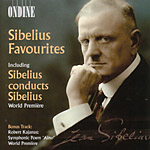Only two of these “Sibelius Favorites” are among his well known works, and both receive fine performances. Mikko Franck leads an En Saga that, while not matching the near-hypnotic concentration and intensity of Salonen and the Los Angeles Philharmonic, generates a magical atmosphere through its scrupulous attention to Sibelius’ finely honed orchestral coloring. Likewise, Tuomas Ollila maintains an impressive continuity of line in his rendition of Pohjola’s Daughter, even if he lacks the rhythmic energy and pacing of Bernstein’s New York Philharmonic performance. The Impromptu and Rakastava, two string works richly saturated in those signature Sibelius harmonies, receive enchanting renditions by the Virtuosi di Kuhmo under Peter Csaba.
The Andante festivo purportedly is the only extant recording of Sibelius conducting his own music. While this has significant historical value, the work’s basically hymnal nature doesn’t give the composer much to “interpret” the way, say, Tapiola or the Seventh Symphony would. Finally, though Robert Kajanus’ 1885 symphonic poem Aino is thought to have influenced the young Sibelius’ music, it actually sounds a lot more like Franz Liszt, especially in its transcendent choral ending. Still, as played by Jorma Panula and the Finnish Radio Symphony, it’s a quite enjoyable work and makes for a unique and satisfying ending to this intriguing and well-recorded disc. Sibelius fans certainly will want this one.
































